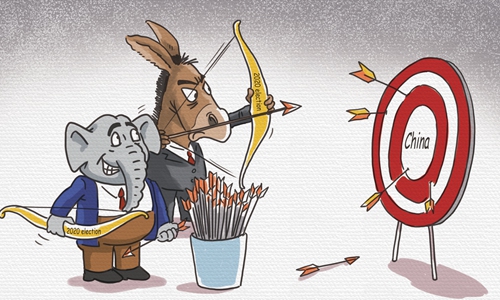
Attacks on China: Depravity in American Politics
I cannot help but say that this is an extremely malicious approach to China. In selecting the next president of the United States, there is nothing but constant criticism of China, which demonstrates the ill-tempered nature of American culture. The highest level of American political debate shows that American officials have no shame when dealing with international politics, and proudly display how offensive and rude they are. This is absolute depravity.
Of course, China is not angered by this—we just see it as strange and are a bit put off by it. This has also sparked the realization that American politics is extremely shallow, the debates between the parties are poorly conducted and most interactions come close to "trash talking." The American culture of arrogance has made a mess of things when the U.S. interferes in the affairs of other countries.
We want to tell the two American political parties this: Please be more civilized, fight your own battles and leave China alone. This request, however, is completely useless. Both parties see election as their primary goal and view the nation’s interests as secondary to this. The common interest of mankind has taken a backseat—neither party is willing to sacrifice an election for the benefit of the public.
This has also made it much more difficult for Chinese people to distinguish between what Americans say about China is true and will become actual policy, and which statements are made purely to win votes in the upcoming election.
One thing is certain—the fierce fight against China in this election will cause the intensification of anti-China public opinion and the further deterioration of U.S.-China relations. Many Chinese researchers who study the U.S. warn that although Washington’s attitude toward China may change after the general election, there has already been some irreversible damage and the general trajectory of the deteriorating U.S.-China relations will be difficult to change.
America’s "democratic system" is far from the rational, rule-based system we imagined it to be in the past. U.S.-China relations are currently so far off track that it is already difficult for the two countries to conduct diplomatic relations. Washington’s actions toward China seem nothing like a nation dealing with one of its biggest trade partners. Before the pandemic, there were dozens of daily flights between the U.S. and China, with hundreds of thousands of passengers each year. Chinese students make up the largest group of international students in the United States, and China is the biggest international market for Hollywood movies, but when Washington discusses China, it is as if they are talking about the Soviet Union from decades ago.
American democracy promotes the spread of radicalism and rationalizes the capriciousness and risky actions of top government officials. The strategic actions of the U.S. government may change international strategy regarding the U.S., since the U.S. has proved itself to be shallower than we had realized.
Before voting starts, both political parties will continue to target China. This will make it difficult for China to remain silent, but reacting too strongly will just be falling into the trap set by the U.S.
We advocate that China not waste any more energy on trying to guess the true views of American politicians’ Regardless of their true intentions, as long as there is no real damage to China, we can pay less attention to the U.S., or even ignore it. If the U.S. violates our interests or offends our diplomatic dignity, however, then we should retaliate without much further thought.
When facing the continuously unpredictable U.S., China’s basic policy is to maintain its rapid development and build on its key strengths. No matter who runs the next American administration, Washington’s hostility to China will not disappear. China needs to establish its ability to defend its own interests rather than hope for a change of heart in Washington.

